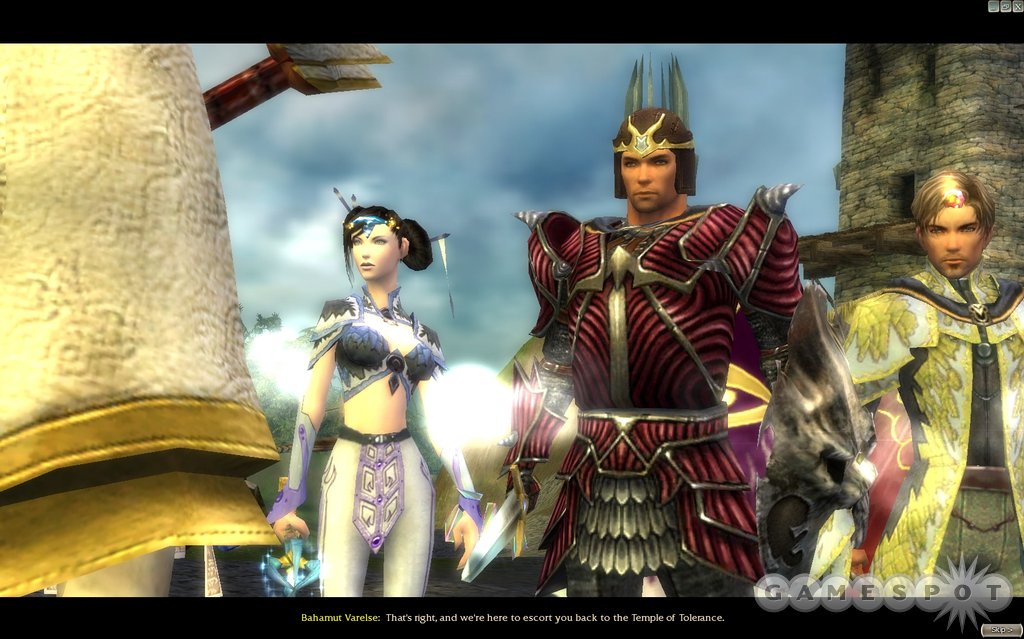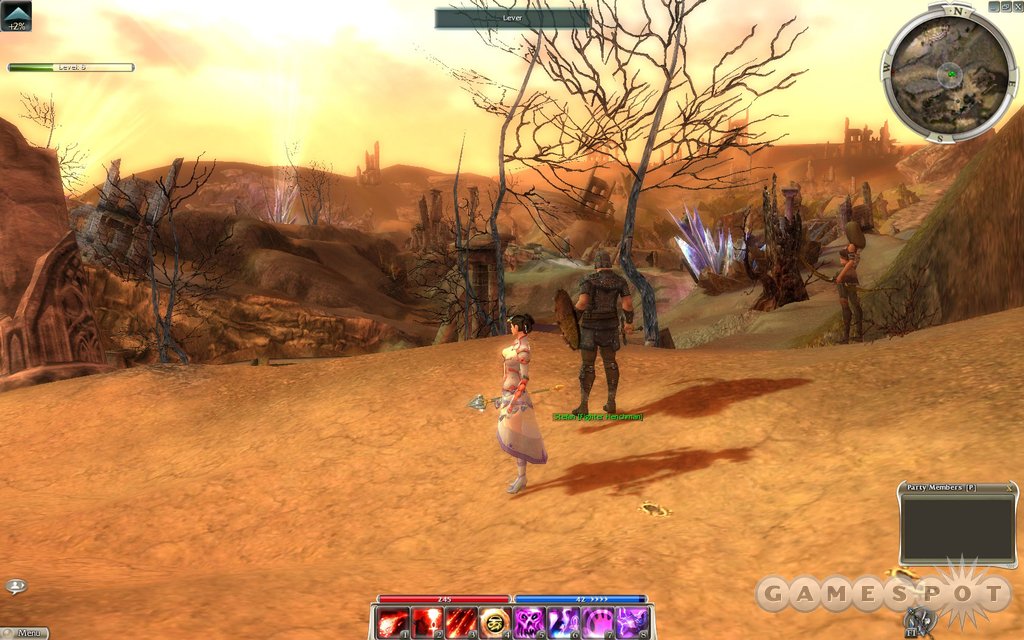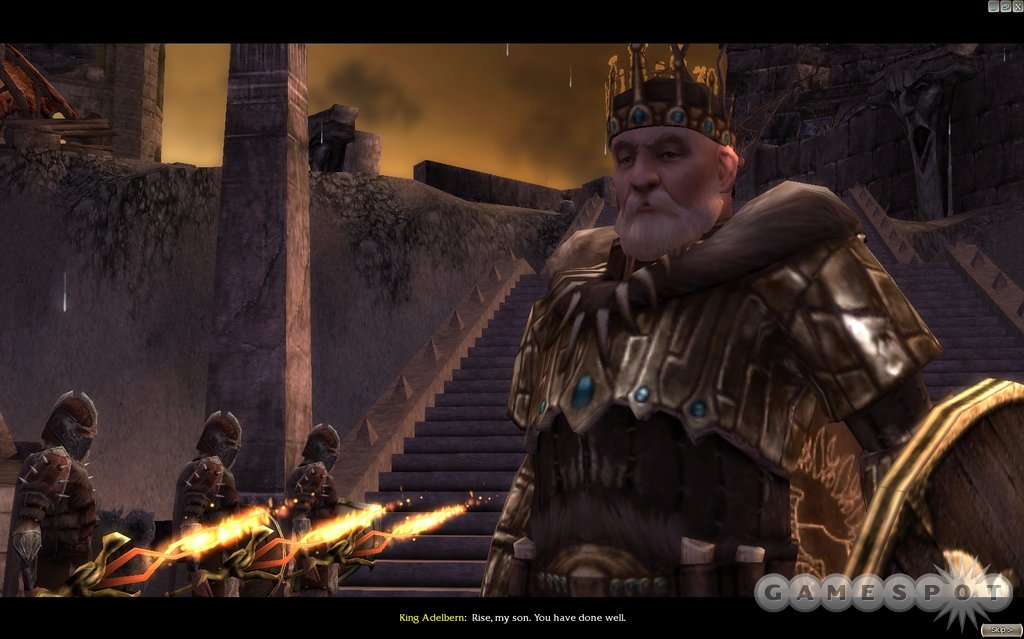While it's tempting to compare Guild Wars to any number of other fantasy-themed role-playing games, there's really never been anything quite like it before. It innovatively and successfully combines many of the best, most addictive properties of action RPGs, online RPGs, and competitive multiplayer games in one beautifully produced package, which offers a tremendous lasting value yet none of the monthly fees typically associated with online-only games. The first title from developer ArenaNet, Guild Wars threatens the entire online RPG establishment with its bold design. More importantly, it's a very impressive game that's rewarding on many different levels and can be tremendously appealing for any number of reasons.

In Guild Wars, you play as a hero from Ascalon, your typical fantasy province that's fallen on hard times, thanks to relentless assaults from fearsome creatures called the charr. Ascalon seems huge and wondrous as you begin to explore it and its outskirts. But it turns out to be literally just a tiny portion of the richly detailed and shockingly gigantic world of Tyria, which you'll explore during the course of an adventure that's truly epic. Meanwhile, the other half of the game consists of competitive battles between teams of players, set in various types of arena events. It's action packed, it's tactical, and it's sporting. It's definitely more involved than a pick-up-and-play first-person shooter, but it's relatively easy to learn and certainly difficult to master. Unlike many other online RPGs, which often take a lot of flak from their audiences for lacking a definitive endgame, Guild Wars gives the impression that it was built with the endgame competition as a primary concern. However, one of its big surprises is just how much noncompetitive content there is. Even if you have no interest in player-versus-player battling whatsoever, Guild Wars will still provide you with more than 100 hours of quality gameplay, which you can tackle either alone or together with other players pretty much every step of the way.
The core gameplay in Guild Wars is reminiscent of action RPGs like the Diablo series. It lets you navigate countless big, winding maps filled with enemies and treasure, and combat is frequent and fast. You can't climb or fall from ledges, so at times, the design of the maps feels pretty contrived. However, the generally linear layout mostly just helps to keep you focused. The game's interface is clean and intuitive, and offers a few neat perks like a minimap that you can scribble on to help you communicate with your team. You have free reign over the camera perspective, so you may choose to play from a first-person viewpoint all the way on out to a bird's-eye view. Although, a third-person behind-the-back angle seems to deliver the best of both worlds, because you'll get a close look at the game's gorgeous graphics and plenty of room to see on your character's periphery. When you see an enemy (whether it's a computer-controlled creature or an opposing player), you may target it with a hotkey or a mouse click, and then attack it with your ranged or melee weapons. Most of your combat will be focused on using your different skills, though.
You can have exactly eight skills readied at a time, which correspond to the number keys on your keyboard. Which eight skills you bring to battle and which skills you discover during your adventure is really at the heart of what makes Guild Wars such a compelling experience. It's what levels the playing field in PvP and keeps the action manageable even when things get really intense. Each of the game's six character classes has 150 unique skills, and each one has its own little icon graphic, description, and purpose. For the most part, skills are not inherently better or worse than other skills--they're just different. Depending on how you've developed your character or your role in a player team, the skills will be better or worse for your circumstances. Many skills have obvious uses, while many are much more specific to certain types of situations. Some will serve you better when exploring the role-playing portion of the game, while others will be better suited to PvP battling against real opponents. It's definitely an interesting selection process. It shares a lot in common with collectible card games, and similarly offers a very satisfying reward whenever you discover that great, new skill that makes you feel much stronger while also causing you to make significant changes to your overall strategy. Guild Wars' skill system is a resounding success.
Creating a character is a quick, straightforward process of choosing a gender, appearance, and character class. You'll quickly notice the game's striking character design right from this point. Even prior to that, though, you're asked to make an important choice: whether to build a standard role-playing character or a player-versus-player-specific character. If you choose the former, you start out as a first-level neophyte on a foreboding day in Ascalon's history. And if you choose the PvP option, you skip all the way through the 100-odd hours of questing and storyline and begin with a high-level character decked out with powerful equipment. He or she can then jump right into some competitive matches, but cannot participate in any cooperative gameplay.

The idea behind these two options is pretty obvious. Players who'd rather not muck around with leveling up and pretentious fantasy storytelling needn't even bother with it, and they can instead jump straight into the competitive game. Or, players who want to get their feet wet before diving into PvP combat, or who want to ignore PvP entirely, may do so during the course of the adventure. It's not quite this cut and dried, though, because Guild Wars wants you to experience both aspects of the game, regardless of whether you think you do or not. Specifically, if you cut straight to the PvP, you'll find that the vast majority of the different character classes' skills are locked away, waiting to be discovered during the course of the role-playing portion. Custom weapon parts can also be found in the campaign, which can later be used in PvP.
So, it's possible that players expecting Guild Wars to be a light and breezy experience will be disappointed, because this is a deep, enthralling, and potentially very time-consuming game. While combat in Guild Wars rewards skillful planning and coordination between players, many of the best Guild Wars players will surely be the ones who invest the largest number of hours into the game--not only honing their talents, but also seeking out the best skills and equipment in the role-playing portion. Fortunately, the role-playing portion is on equal footing with the PvP, so chances are you'll enjoy the opportunity to experience both, and appreciate the game all the more for it.
Guild Wars is one of those games that you can easily play for long stretches while losing track of the hours--suddenly it's dark out, or light out, as the case may be. However, in contrast to many other RPGs, there's very little about Guild Wars that inherently demands a lot of your time all at once. It was clearly designed from the ground up to allow you to play in brief spurts, for minutes or maybe for an hour at a time. The PvP battles are action-packed affairs along the lines of what you'd expect from a competitive shooter. The role-playing quests and cooperative missions are typically less than an hour long. Also, you never need to worry about saving your progress or logging out in a safe area, because you can quit whenever you want to, and you'll always restart in the nearest town with all your skills and experience intact. There are no severe or permanent penalties from getting killed--just a temporary hit to your maximum health and energy levels that goes away when you get back to town.

From a technical standpoint, the game is a marvel. It boots up and quits out instantly, downloads software updates quickly and automatically, and runs wonderfully in a window if you prefer (you do need to be connected to the Internet whenever you're playing, though). Unlike in other online RPGs, logging in and quitting out is painless, and your character is also capable of instantly teleporting between all the cities and towns you've ever visited, at any time. These locations effectively serve as lobbies, and they're packed with players looking for other players to be their teammates. Or, if you can't find a good player team (or don't want to), the cities and towns let you fill out your team with computer-controlled henchmen.
For better or worse, these henchmen aren't as good as the real thing. Later on in the adventure, they'll be ill equipped to help you through some of Tyria's most dangerous environments. We also had them bug out on us on several occasions, either by getting stuck in the environment or flying off to who knows where. But the game generally makes it really easy to start and restart quests and missions, and finding willing players to work with is also fairly simple, which makes the occasional problems with the henchmen easy to dismiss. There's another issue that has to do with the game's cities and towns, which is that they can be overwhelming because they can be filled with so many players. There's no simple, obvious way to get into a group, short of clicking on the different people you see and then clicking a little plus icon that invites them to join you, so chat channels tend to be filled with requests from players looking for teammates. Also, there's no easy way to compare your pending quests with your teammates' pending quests short of just chatting about it, so it can be especially difficult to find a willing group to go questing out in the wilderness, versus taking on the cooperative missions that start out in town. And there's some slight but noticeable lag when you type chat messages. For a game with player community at its heart, Guild Wars seems somewhat devoid of amenities for enabling players to meet one another.
Furthermore, since Guild Wars makes it so easy to jump around the world, as well as to start up and exit out of the game in the first place, the player community doesn't exactly seem warm and friendly, on the whole. For example, if a quest or mission doesn't go well, random teammates are liable to quit without any warning, which can be frustrating to those left behind. As with just about any online game, the solution to this sort of issue is to play with friends instead of with strangers. To this end, Guild Wars actually has another leg up on most online RPGs, in that it lets you freely communicate with any other player in the gameworld, while most online RPGs limit you to communicating only with players on the same server, which contains its own instance of the gameworld.

Guild Wars uses a different sort of technology. Towns and cities that have too many players in them are automatically split up into "districts," akin to separate chat lobbies, while missions and wilderness areas are always uniquely generated for the player team, so you'll never encounter random players or seas of already-killed monsters when you're out exploring the world. For the most part, that's great. But to an extent, it's actually a double-edged sword, since the fairly abstract manner in which the gameworld is set up diminishes some of the sense of immersion. It's difficult to fully appreciate the scale and the dangers of the world when you can freely and instantly teleport between the areas marked on your map. In other words, Tyria doesn't feel quite as cohesive as it could have, with the extremely brief but frequent loading screens between maps, and the fact that the towns and cities are all inundated with out-of-character banter. Additionally, the key story sequences are presented in full speech, which is nice, but most of the questing is conveyed through small text-based pop-up windows, which aren't very engrossing, especially not in the context of the game's otherwise-outstanding presentation. For that matter, the rewards for the game's dozens of different side quests often aren't even pertinent to your character. So the questing system can sometimes seem unfocused. It's mostly just there to give you more of a reason to explore the gameworld at your own pace--which, luckily, is enjoyable enough on its own.
There's definitely a learning curve involved in getting proficient at Guild Wars, at least as far as the PvP gameplay goes. For one thing, because the game features a nonstandard character class system, which encourages you to choose both a primary and a secondary profession from six different options (for a total of 30 different combinations), the result is having to learn lots of obscure abbreviations like "R/N" and "Mo/Me" (referring to ranger/necromancers and monk/mesmers, respectively, just in case you were wondering). Fortunately, the role-playing portion of the game mostly does a great job of introducing you to the different layers of gameplay at a steady pace. You'll start out being able to casually adventure on your own (an optional early quest invites you to group with just one other player). Later, you'll be able to form groups of four, then six, and then more. Each time, it feels like a significant upgrade, requiring you to rethink your place in the team as well as your overall strategy. Eventually, teaming up with other players starts to feel like a necessity rather than a simple choice. Some of Guild Wars' final quests are both very open-ended and challenging. And they also serve as a primer for the sorts of PvP battles you could later proceed to engage in.

While you can participate in random PvP battles, the odds are good that you'll meet up with (or will go in already knowing) some like-minded individuals with whom you'll want to form a guild. Forming a guild mostly just enables you to readily communicate with other members of your guild, though you can also customize a unique insignia that all your guildmates may proudly wear on their flowing cloaks. Being a member of a guild also allows you to get the most out of the game's PvP elements. International PvP competitions between guilds are already taking place, as players from all around the world battle it out in multi-team skirmishes, pitting their best combinations of skills and tactics against each other. When spells and counterspells are flying, as melee fighters close the distance with ranged assailants and supporting forces, the action can get hectic and very exciting. And since you can have literally hundreds of different skills to choose from across your two professions, you ought to have your hands full for a good, long time. So if the solo and cooperative portions of Guild Wars start to take on a certain monotonous feel after a while, leave it to PvP for a complete change of pace.
It sure doesn't hurt that Guild Wars is so easy on the eyes. This is an excellent-looking game, both from a technical and from an artistic standpoint. Character designs are fresh takes on fantasy conventions. Each character gender/class combination has a unique and memorable look, plus many options for customization (as well as some unique and amusing social animations), so you won't be seeing many clones of yourself while running around in Tyria. The various creatures you'll encounter are also imaginative and interesting, varying wildly in shape and size. Though, sadly, none of them bleed. The environments of Guild Wars may be the biggest attraction from a graphical standpoint. This is one beautifully detailed world, offering up larger-than-life versions of pretty much every type of environment you could think of, all rendered in a vivid, soft-focused look that gives the game a dreamlike quality that totally works. In spite of all this, Guild Wars runs great even on relatively modest systems, and even when tons of people are running around or duking it out. The game's few graphical rough edges, such as how characters seem to pop in piece by piece when you enter a new area, wouldn't even be worth mentioning if the superlative graphics didn't make them stick out a little.

The game doesn't sound quite as impressive as it looks, but that's kind of an unfair way of putting it, since Guild Wars sounds great. A symphonic musical score by renowned composer Jeremy Soule helps imbue each of Tyria's distinct regions with its own personality, and while the music is of uniformly high quality, it can start to grow a bit repetitive as you explore within a given type of environment. The sounds of combat pack a good, solid punch, and different types of weapons and skills in turn make distinctive noises, which all tend to fit the action well. Guild Wars also has some nicely done ambient sound effects, but given the nature of the gameplay, you'll end up hearing a lot of the same effects over and over. Interestingly, you can actually hear your otherwise-silent character speaking during some of the cutscenes, which will probably make you wish you could hear his or her voice more often, such as in tandem with the different social animations.
It seems like a common observation among longtime game players that games have gotten shorter and smaller over the years. The rigors of game design are such that it's generally just not reasonable to expect games that are both of very high quality and that are also very long, but at the same time, there's something to be said for a tightly paced gaming experience. Still, you can never have too much of a good thing. But Guild Wars comes awfully close. It pulls out all the stops to win you over.